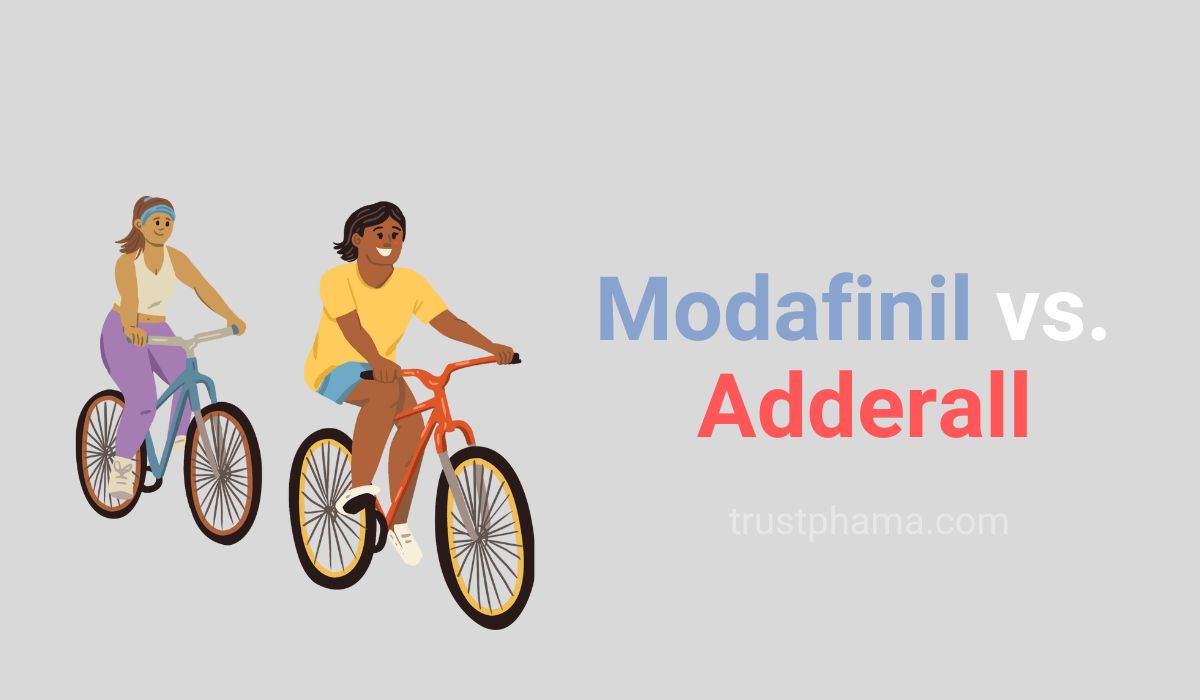Modafinil and Adderall are two widely used medications for enhancing focus, managing fatigue, and improving wakefulness. While they share some similarities, they are distinct in their mechanisms, uses, and potential risks. This article provides a comprehensive comparison of Modafinil vs Adderall to help you understand their differences and make informed decisions.
What Is Modafinil?
Modafinil (brand names: Provigil, Modalert) is a prescription medication approved for the treatment of:
- Narcolepsy
- Obstructive sleep apnea (to improve wakefulness)
- Shift work sleep disorder
It is also used off-label as a nootropic or “smart drug” for enhancing focus, alertness, and cognitive performance.
How It Works: Modafinil affects dopamine, norepinephrine, and histamine in the brain, promoting wakefulness and sustained attention without the intense stimulation caused by other stimulants.
What Is Adderall?
Adderall is a combination of amphetamine salts and is primarily prescribed for:
- Attention deficit hyperactivity disorder (ADHD)
- Narcolepsy
Adderall stimulates the central nervous system, increasing the availability of dopamine and norepinephrine in the brain. This leads to enhanced focus, attention, and energy levels.
Modafinil vs Adderall: A Comparison
| Feature | Modafinil | Adderall |
|---|---|---|
| Primary Use | Sleep disorders, off-label cognitive enhancement | ADHD, narcolepsy |
| Mechanism of Action | Promotes wakefulness via dopamine and histamine modulation | Direct stimulant of dopamine and norepinephrine |
| Effect on Sleep | Improves wakefulness without intense overstimulation | Can disrupt sleep due to strong stimulant effects |
| Onset of Action | 30–60 minutes | 20–30 minutes |
| Duration | 10–12 hours | 4–12 hours (depending on formulation) |
| Risk of Addiction | Low (relative to Adderall) | High potential for abuse and dependency |
| Common Side Effects | Headache, nausea, anxiety | Insomnia, loss of appetite, jitteriness |
| FDA Schedule | Schedule IV (low abuse potential) | Schedule II (high abuse potential) |
Key Benefits
Modafinil
- Long-Lasting Energy: Its 10–12 hour duration provides sustained wakefulness without “crashing.”
- Lower Addiction Risk: Modafinil has a much lower potential for abuse compared to Adderall.
- Minimal Euphoria: It enhances focus without the intense euphoria associated with amphetamines, reducing misuse.
Adderall
- Powerful Cognitive Enhancer: Adderall can provide a noticeable boost in focus, attention, and energy.
- Proven for ADHD: It’s one of the most effective medications for managing ADHD symptoms.
- Immediate Results: The effects are strong and felt quickly.
Risks and Side Effects
Modafinil
- Headache
- Nausea
- Anxiety or agitation
- Insomnia (if taken late in the day)
- Rare but serious skin reactions like Stevens-Johnson syndrome
Adderall
- Insomnia
- Decreased appetite and weight loss
- Increased heart rate and blood pressure
- Risk of dependency and abuse
- Withdrawal symptoms upon discontinuation
Which Is Better for You?
The choice between Modafinil and Adderall depends on your condition, lifestyle, and goals:
- For ADHD: Adderall is FDA-approved and more effective for managing ADHD symptoms. Modafinil is not approved for ADHD, though some people use it off-label.
- For Narcolepsy or Sleep Disorders: Both drugs are effective, but Modafinil may be preferred for its lower abuse potential.
- For Cognitive Enhancement: Modafinil is a popular choice among students and professionals due to its safety profile.
Final Thoughts
Buy Modafinil and Adderall online uk, are effective medications, but they cater to different needs. While Modafinil offers a safer and longer-lasting option for wakefulness and focus, Adderall delivers a more potent and immediate impact, particularly for ADHD. However, the higher risk of addiction and side effects makes it essential to use Adderall under strict medical supervision.
If you’re considering either medication, consult your doctor to evaluate your needs, medical history, and potential risks.
Disclaimer: This article is for informational purposes only and not a substitute for professional medical advice. Always consult a healthcare provider for personalized guidance.
